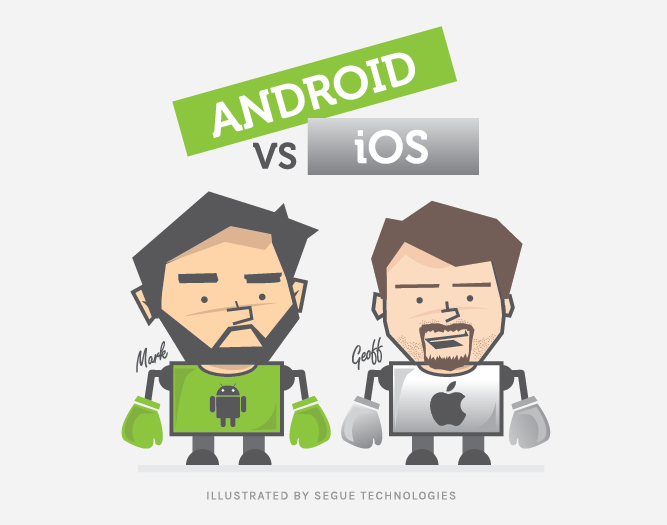One of the questions we at Segue are often asked by our customers is, “Which platform should I build for first, Android or iOS?” There are many different aspects to consider when answering this question. To answer it fully, we’ve brought together two of our mobile application developers: Geoff Bender, our lead iOS developer, and Mark R. Andrachek, Jr., our lead Android Developer.

By now we have discussed market share, hardware and software and cost and time. However, there is still one more question left to answer: Is it a two for one special? If you build your Android and iOS mobile application at the same time does it take the same amount of time and money? Is it easier?
Mark Andrachek our lead Android Developer: If you want your application to have the broadest reach it makes sense to develop for Android first. If your application is ad-supported, it makes sense to develop for Android first. If your app is not location specific, and you want to have a global reach, it makes sense to develop for Android first. If you have specific hardware you want to leverage that’s only available on Android, it makes sense to develop for Android first.
Lastly, you need to evaluate your app’s competitive position – it may be that Android is underserved in comparison to iOS (or vice-versa) – and this evaluation may override any other considerations.
Geoff Bender, Lead iOS Developer: I’d say in a lot of ways it is a two for one special. I mean as far as project management and requirements analysis- those can be shared. The graphics team can also be shared. The overall general design is going to be very similar, but each platform has its own set of interface guidelines so there will be some stylistic differences. If you have a backend database with an API, both platforms should be able to utilize that without much trouble. A lot of the logic and the algorithms- how you approach solutions to problems- can be shared between the two platforms. The testing department should be able to test both platforms equally as well, with differences really coming into play if automated and/or unit testing scripts need to be written. Really, the biggest difference between iOS and Android just comes down to language syntax and user interface experience- how they (users) interact with the device.
Looking for more information on Mobile App Development? Download our eBook Planning Your Mobile Application below:


